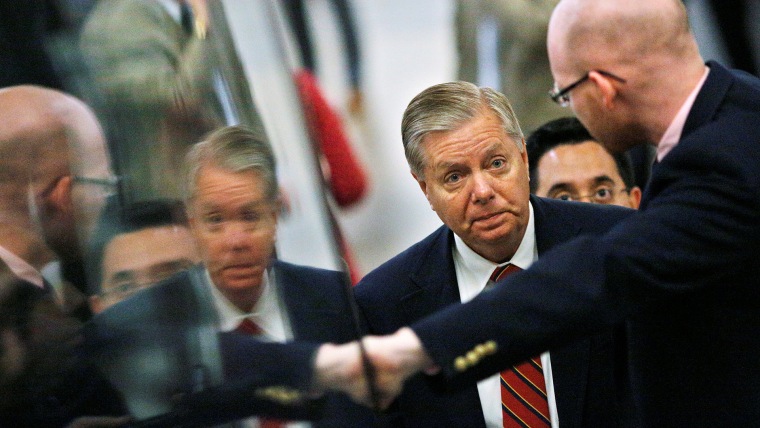The list of Republican health care bills that have failed so far this year isn't short. House Speaker Paul Ryan's (R-Wis.) original GOP plan, for example, was so short on votes, party leaders didn't even bring it to the floor. In the Senate, the first iteration of Majority Leader Mitch McConnell's (R-Ky.) plan failed, as did his second.
"Repeal and replace" didn't have the votes, and neither did "repeal and delay." The "skinny repeal" bill came close, but it failed, too.
And though I've lost count of just how many competing bills have come and gone with various tweaks, I can report that there's still one Republican health care plan standing. It's sponsored by Sens. Lindsey Graham (R-S.C.), Bill Cassidy (R-La.), and Dean Heller (R-Nev.), and as Vox explained yesterday, it's arguably "the most radical" proposal the party has presented to date.
The senators are selling this idea as a compromise plan and say it is a way to return power to states, giving local governments more control over how they spend federal dollars. [...]But the plan does much more than that. The proposal would eliminate the health care law's subsidies for private insurance and end the Medicaid expansion. The health insurance marketplaces would no longer exist as they are envisioned to continue under other Republican proposals..... Cassidy-Graham would arguably be more disruptive, not less, to the current health care system. It would let money currently spent on health insurance go toward other programs, providing no guarantee that the Affordable Care Act programs individuals rely on today would continue into the future.
For now, there's no score from the Congressional Budget Office on this bill, but the Center on Budget and Policy Priorities published a helpful analysis and found that "many millions of people would lose coverage" if the proposal were implemented.
So, could this bill pull together the support needed to pass?
Its advocates are acting as if that's a real possibility. Politico reported yesterday that Cassidy, Graham, and Heller "met Monday with top aides to President Donald Trump, and there are efforts also underway to get the endorsement of conservatives Mike Lee of Utah and House Freedom Caucus Chairman Mark Meadows (R-N.C.)."
Cassidy also reportedly met with Health and Human Services Secretary Tom Price and some governors, and the Louisiana Republican described the discussions as "productive."
Of course, the question isn't whether there will be Republican support for this radical approach; the question is whether there will be enough Republican support for it. By all accounts, the votes simply aren't there -- at least not yet.
In fact, proponents of this bill are fighting more than one battle: not only is it tough to convince GOP senators to endorse legislation that would take coverage from millions of families, it's at least as difficult to persuade them to keep pursuing health care as an issue. Many in the party are content to simply move on and turn their attention to tax reform.
But the moral of the story is that the repeal crusade isn't entirely dead. There's still another bill, there are still strategy meetings underway, and there are still discussions about how to get to 50 votes. It's difficult to imagine some of the Senate's less conservative members going along with a proposal this extreme, but this is worth keeping an eye on.
So long as repeal advocates control the levers of power, the threat to the existing system remains real.
